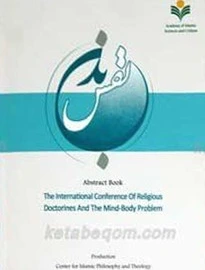The international conference of Religious Doctorines And The Mind-Body Problem

The Center for Islamic Philosophy and Theology has focused its research programs on macro-projects in order to enrich the intellectual-cultural heritage, propose new inquiries, discover novel grounds, correct and comprehensive reformulation of the issues in the heritage, pave the path for theorization and pushing the boundaries of knowledge. In this direction, the Center has on its agenda the translation of important issues and holding academic seminars, in addition to research works regarding the topics of the macro-projects.
Because of the significance of anthropological issues for Islam and other Abrahamic religions and the theological implications of mind-body theories, the Center decided to found studies about the philosophy of mind and philosophical psych order to reformulate and reintroduce the Islamic traditional theories of the philosophical psychology (ilm al-nafs consideration of, and comparison with, contemporary theories in the philosophy of mind. Therefore, the macro-project of “the mind-body relation” was established in 2006.
Some published or nearly-published (Farsi) works of this macro-project ever since then are: An Introduction to the Philosophy of Mind, A Descriptive Bibliography of the Philosophy of Soul, An Examination of Physicalistic Theories of the Mind, Emergentism and Consciousness, Faculties of the Soul and the Modularity of the Mind, Christianity and the Mind-Body Problem, Dualism and Behaviorism, The Identity Theory, Functionalism and Eliminativism.
Given the desirable progress of this macro-project and because of the role the mind-body theories play in our accounts of most religious doctrines, the Center decided to hold the International Conference of Religious Doctrines and the Mind-Body Problem, which was welcomed by thinkers and philosophers around the world. Great Islamic scholars of Islamic Seminary ( such as Ayatollah Javadi Āmoli, Ayatollah Seyyed Hassan Mosṭafavi, Ali Abedi Shahroudi, Ahmad Va’ezi, Seyyed Yadollah Yazdanpanah, Gholamreza Fayyazi, Amir Divani, Reza Berenjkar, Iranian university professors such as Mohammad Saeedimehr, Reza Akbari, Hossain Sheykhrezaee, and foreign visitors such as Lynne Rudder Baker and Edward Wierenga.
A Report of the Conference
After the approval of the conference in the Islamic Sciences and Culture Academy, the conference posters and the brochures (in three languages of Farsi, Arabic and English) were sent to over 70 Iranian academic centers and 120 centers abroad. papers, 9 Arabic papers and 21 English papers were received by the Secretariat of the conference, both through the call papers and by the Iranian and Non-Iranian invitees. In order to introduce the contemporary theories of the soul body relation in Islamic philosophy, some dialogues were made with contemporary figures in the field, such as Ayatollah Mostafavi, Ayatollah Seyyed Razi Shirazi, Seyyed Yadollah Yazdanpanah, Ali Abedi Shahroudi, Gholamreza Fayyazi, Muhammad Hossein Heshmatpour, Gholamhossein Ebrahimi Dinani, and Seyyed Yahya Yasrebi.
Also two pre-conferences have been held; “The Soul Relation in Sadraean Philosophy and Islamic Peripatetic Philosophy” by the contribution of Ayatollah Mostafavi, Abdorrasul Oboudiat and Ali Afzali on January 20, “The Soul-Body Relation in Quran and Hadith” by the contribution of Mohammad Taqi Sobhani, Reza Berenjkar, and Mahdi Zakeri on February 17, 2011.
Also in order to introduce some Western mind-body theories and their accounts of the resurrection, 8 weekly seminars were held as follows:Lynne Baker’s constitution view and its account of the resurrection (by Mahmoud Morvarid in two sessions: December 22 and 29, 2010), emergentism and its account of resurrection (by Yasser Khoshnevis in two sessions: and 12, 2011), Peter van Inwagen’s eliminativist view and its account of the resurrection (by Mahmoud Morvarid in two sessions: January 19 and 26, 2011) and Alvin Plantinga dualism and its account of the resurrection (by Mansour Nasiri in two sessions: February 9 and 16, 2011).
Finally I should thank Ebrahim Alipoor, the head of the Philosophy Department where the conference was organized, Mohammad Taqi Sobhani, the Scientific Secretary of the conference, Yasser Pouresmail, the director of the conference, Mohammad Reza Zekavat, the Conference Ceremonial and Information Secretary, Ghaffar Shave’ei, the Conference Finance and Sponsorship Secretary, Habib Ghahramani, the Conference International Secretary. I should also thank the members of the scientific council of the conference, Reza Akbari, Reza Berenjkar, Lynne Rudder Baker, Charles Taliaferro, Mohsen Javadi, Mohammad Taqi Sobhani, Mahdi Zakeri, Mohammad Saeedimehr, Gholamreza Fayyazi, Muhammad Legenhausen, Uwe Meixner, Mansour Nasiri, Edward Wierenga. I shall appreciate the efforts of the paper evaluators, faculty members, office managers and colleagues of the Center for Islamic Philosophy and Theology. It is hoped that the conference helps enrich the literature on the topic and make the grounds for the religious inter-dialogue between Christian and Islamic scholars.
[wp-embedder-pack width=”100%” height=”400px” download=”all” download-text=”” attachment_id=”72819″ /]

